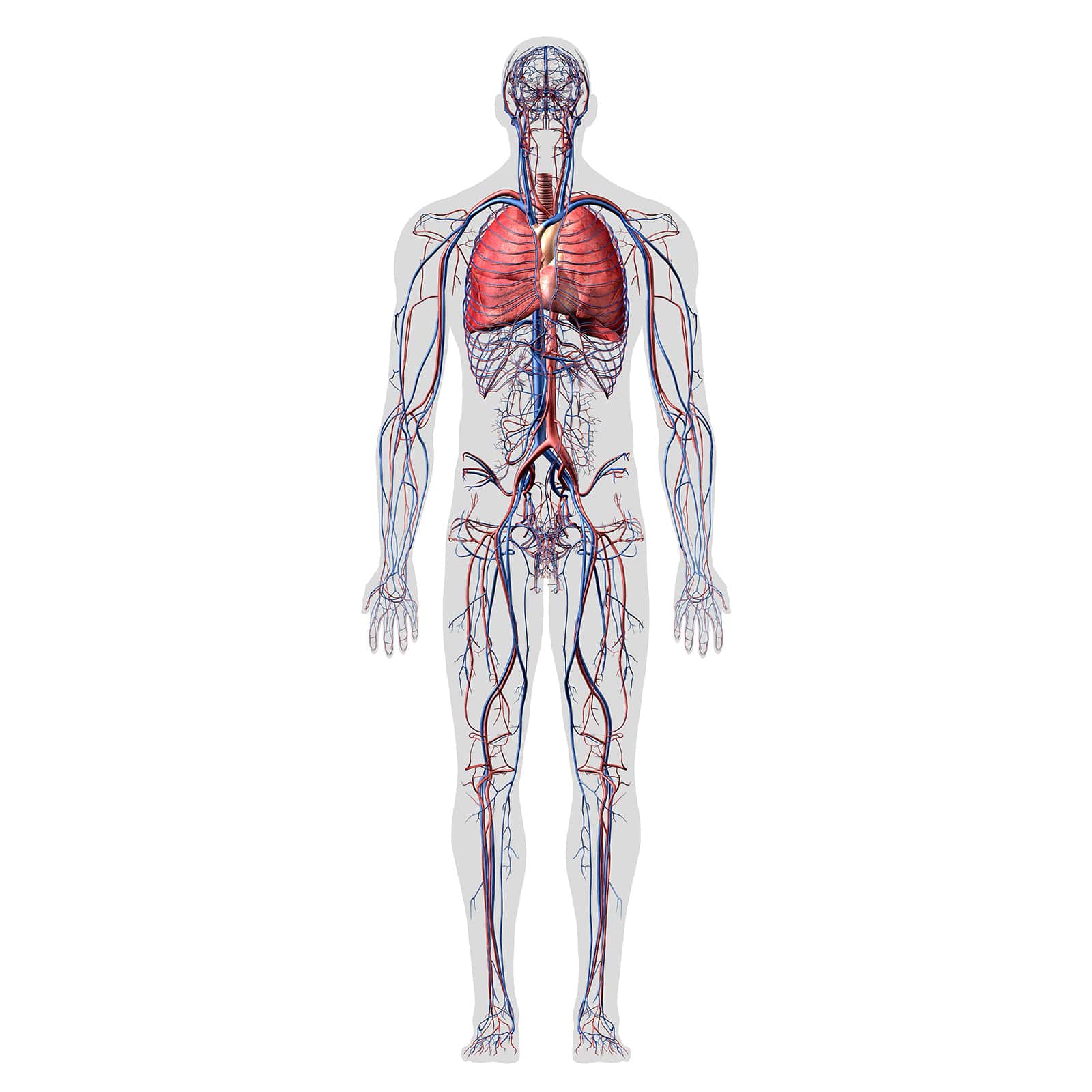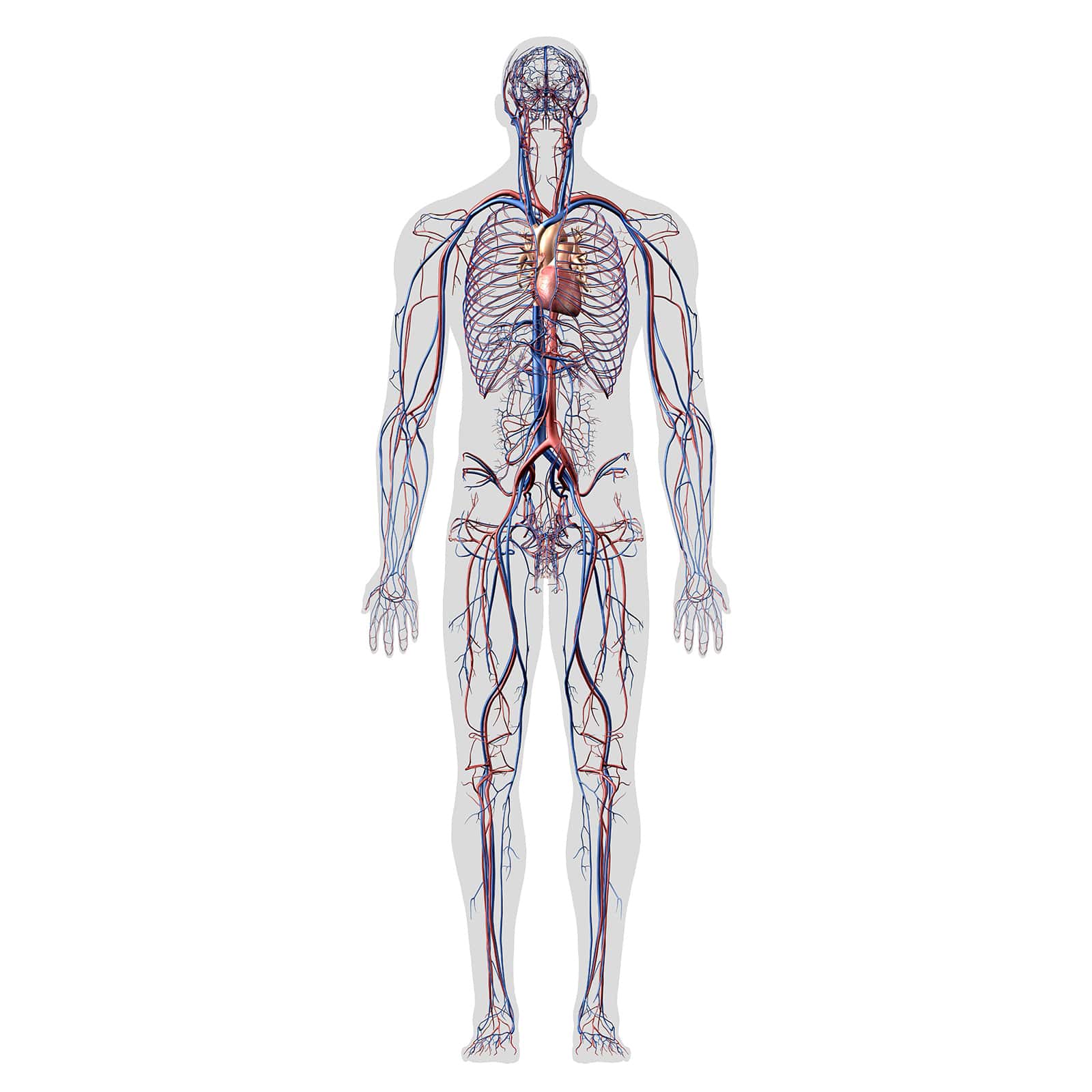MRI scans serve as a powerful diagnostic tool for identifying abnormalities inside the body without the need for invasive biopsy surgeries.
This can help diagnose soft tissue diseases, find the source of pain or inflammation, and identify abnormal tissue or tumour growth.
In a typical MRI scan, only one specific area or part of the body is scanned.
A full-body MRI scan can check for up to 362 potential conditions, making it a powerful preventative check of your overall health.
In our full body MRI scans
A full-body scan includes all the important organs and structures of the body. These are areas that are the most complex and are the areas that are most prone to disease, abnormal growth, or degeneration.
Brain
(including MRA of blood vessels)
Neck blood vessels
(MRA of Carotid arteries)
Chest
(not including heart or lungs)
Abdomen
(including overview of liver, kidneys, spleen, pancreas, gallbladder)
Pelvis
(Female: includes uterus, ovaries and urinary bladder, Male: includes prostate and urinary bladder)


Tumours
Lesions
Aneurisms
|
Full Body Scan Diamond
£2999 |
Full Body Scan Platinum
£2499 |
Full Body Scan Gold
£1999 |
Full Body Scan Silver
£1499 |
Full Body Scan Bronze
£999 |
|
|---|---|---|---|---|---|
| MRI Scan | |||||
| Head | |||||
| Neck | |||||
| Chest | |||||
| Upper Abdomen | |||||
| Lower Abdomen | |||||
| Pelvis | |||||
| Brain | |||||
| Carotid Arteries | |||||
| Cervical Spine | |||||
| Thoracic Spine | |||||
| Lumbar Spine | |||||
| MRI Reporting Time | 2 Working Days | 2 Working Days | 2 Working Days | 2 Working Days | 7 Working Days |
|
Reported by GMC
|
Yes | Yes | Yes | Yes | Yes |
| Blood Tests | Full Blood Count | ||||
|
Haemoglobin
Measures the amount of oxygen-carrying protein in red blood cells, helping diagnose anaemia and monitor its severity.
|
|||||
|
Platelet Count
Determines the number of platelets involved in blood clotting, essential for assessing bleeding disorders and overall clotting function.
|
|||||
|
RBC
RBC (Red Blood Cell Count): Counts the number of red blood cells per volume of blood, aiding in the diagnosis of anaemia and other blood disorders.
|
|||||
|
WBC
WBC (White Blood Cell Count): Counts the number of white blood cells per volume of blood, indicating infection or inflammation.
|
|||||
|
Neutrophils
Different types of white blood cells that help fight infections and indicate specific immune responses.
|
|||||
|
Lymphocytes
Different types of white blood cells that help fight infections and indicate specific immune responses.
| |||||
|
Monocytes
Different types of white blood cells that help fight infections and indicate specific immune responses.
| |||||
|
ESR
ESR (Erythrocyte Sedimentation Rate): Measures the rate at which red blood cells settle in a tube, indicating inflammation or infection in the body.
| |||||
|
PCV
PCV (Packed Cell Volume): Measures the percentage of red blood cells in the total blood volume, helping diagnose anaemia or dehydration.
| |||||
|
MCV
MCV (Mean Corpuscular Volume): Measures the average size of red blood cells, useful in identifying different types of anaemia.
| |||||
|
MCH
MCH (Mean Corpuscular Haemoglobin): Calculates the average amount of haemoglobin in red blood cells, assisting in diagnosing types of anaemia.
| |||||
|
MCHC
MCHC (Mean Corpuscular Haemoglobin Concentration): Determines the average concentration of haemoglobin in red blood cells, aiding in diagnosing various types of anaemia.
| |||||
|
RDW
RDW (Red Cell Distribution Width): Measures the variation in red blood cell size, useful in diagnosing different types of anaemia.
| |||||
|
Eosinophils
Different types of white blood cells that help fight infections and indicate specific immune responses.
| |||||
|
Basophils
Different types of white blood cells that help fight infections and indicate specific immune responses.
| Liver Function | ||||
|
ALT
ALT (Alanine Aminotransferase): Evaluates liver health and detects liver damage or disease.
| |||||
|
AST (SGOT)
Assesses liver and heart function, and detects liver damage.
| |||||
|
Calcium
Assesses calcium levels, important for bone health, muscle function, and nerve signalling.
| |||||
|
Albumin
Evaluates liver and kidney function, as well as nutritional status.
| |||||
|
GGT
GGT (Gamma Glutamyl Transferase): Evaluates liver and bile duct function, and helps diagnose liver diseases.
| |||||
|
Bilirubin
Measures the level of direct bilirubin, indicating liver and bile duct function.
| |||||
|
Globulin
Measures the total amount of globulins in the blood, helping diagnose certain diseases.
| |||||
|
Alkaline Phosphatase
Assesses liver and bone health, and detects bile duct obstruction.
| |||||
|
Protein Total (Blood)
Measures the total amount of proteins in the blood, reflecting nutritional status and liver function.
| |||||
|
Adjusted Calcium
Calculates the corrected calcium levels, accounting for albumin levels.
| |||||
|
SGPT
SGPT (Serum Glutamic Pyruvic Transaminase): Detects liver damage and evaluates liver function.
| Nutritional and Diabetic | ||||
|
Vitamin B12
Evaluates vitamin B12 levels, essential for red blood cell production and nerve function.
| |||||
|
Glucose
Evaluates blood sugar levels, aiding in the diagnosis and management of diabetes.
| |||||
|
Hba1c
Hba1c (Glycosylated Haemoglobin): Provides a measure of average blood glucose levels over the past few months, aiding in the diagnosis and management of diabetes.
| |||||
|
Vitamin D (25-OH)
Measures the level of vitamin D in the body, crucial for bone health and calcium absorption.
| |||||
|
Folic Acid
Measures the level of folic acid (vitamin B9), important for red blood cell production and overall health.
| |||||
|
Serum Folate
Measures the level of folate (vitamin B9) in the blood, essential for cell growth and DNA synthesis.
| Iron and Anaemia | ||||
|
Iron
Measures the amount of iron in the blood, important for red blood cell production.
| |||||
|
Ferritin
Assesses iron storage levels in the body and helps diagnose iron deficiency or overload.
| |||||
|
Reticulocyte Count
: Measures the percentage of young red blood cells, aiding in diagnosing and monitoring anaemia.
| |||||
|
TIBC
TIBC (Iron Binding Capacity): Evaluates the blood's capacity to bind and transport iron, assisting in diagnosing iron-related disorders.
| |||||
|
Transferrin
Measures the level of transferrin, a protein involved in iron transport, assisting in diagnosing iron-related disorders.
| Hormonal and Cancer | ||||
|
TSH
TSH (Thyroid-Stimulating Hormone): Evaluates thyroid function and helps diagnose thyroid disorders.
| |||||
|
FT3
FT3 (Free Triiodothyronine): Measures the active form of thyroid hormone.
| |||||
|
FT4
FT4 (Free Thyroxine): Measures the unbound form of thyroid hormone.
| |||||
|
Thyroxine (T4)
Evaluates the total amount of thyroid hormone in the blood.
| |||||
|
PSA
PSA (Prostate Specific Antigen): Screens for prostate cancer or other prostate-related conditions.
| |||||
|
Testosterone
Measures the level of testosterone, important for male sexual development and reproductive function.
| |||||
|
CEA
CEA (Carcinoembryonic Antigen): Detects certain cancers, particularly colorectal cancer.
| |||||
|
CA19-9
A tumour marker used to evaluate and monitor pancreatic and gastrointestinal cancers.
| |||||
|
LH
LH (Luteinizing Hormone): Assesses reproductive hormone levels and aids in diagnosing fertility issues.
| |||||
|
FSH
FSH (Follicle-Stimulating Hormone): Measures reproductive hormone levels and assists in diagnosing fertility problems.
| Inflammatory and Autoimmune | ||||
|
CRP
CRP (C-Reactive Protein): Measures the level of inflammation in the body and helps diagnose infections and certain diseases.
| |||||
|
IgA
IgA (Immunoglobulin A): Assesses the level of immunoglobulin A, which plays a role in the immune response.
| Bone & Cardiac | ||||
|
Total Cholesterol
Measures the total amount of cholesterol in the blood, indicating the risk of cardiovascular disease.
| |||||
|
Triglycerides
Assesses the level of triglycerides, a type of fat, in the blood, indicating the risk of heart disease.
| |||||
|
HDL
HDL (High-Density Lipoprotein): Evaluates the level of "good" cholesterol that helps remove "bad" cholesterol from the bloodstream, indicating cardiovascular health.
| |||||
|
LDL
LDL (Low-Density Lipoprotein): Measures the level of "bad" cholesterol associated with an increased risk of heart disease.
| |||||
|
Bone Screen (Blood Only)
Assesses bone health and detects conditions like osteoporosis or bone tumours.
| |||||
|
CPK-MB
CPK-MB (Creatine Kinase-MB): Measures the level of an enzyme released during heart muscle damage, aiding in diagnosing heart attacks.
| Kidney Function | ||||
|
Creatinine
Assesses kidney function by measuring the waste product creatinine in the blood.
| |||||
|
Uric Acid
Measures the level of uric acid, useful in diagnosing conditions like gout.
| |||||
|
Electrolytes
Evaluates the levels of essential minerals like sodium, potassium, and chloride, crucial for body functions.
| |||||
|
Urea & Electrolytes
A panel of tests that assess kidney function and electrolyte balance.
| |||||
|
CKD eGFR
CKD eGFR (Chronic Kidney Disease estimated Glomerular Filtration Rate): Estimates the kidney's filtering capacity and helps diagnose and monitor kidney disease.
| |||||
| Blood Tests Reporting Time | 2 Working Days | 2 Working Days | 2 Working Days | 2 Working Days | |
| Fast-Track Bookings | |||||
| Blood Pressure Check | |||||
| Digital Copy of Scan | |||||
| CD of Images | |||||
| Interest Free Credit | |||||
|
Preliminary Online Evaluation (i)
prior to your scan, a detailed and thorough medical evaluation will be done online with you including a comprehensive medical history.
|
|||||
|
Post-Scan Review With GMC
|
Booking your full-body MRI scan with MRI Plus is easy and hassle-free. You don't need a referral to book a scan with us, and you can choose from our fast-track booking options to get your scan done as quickly as possible. Once you've booked your scan, we'll do a preliminary evaluation online to make sure you're ready for your scan.
During your scan, we'll take detailed images of your entire body using our state-of-the-art MRI machine. After your scan, a GMC-qualified radiologist will carefully review all your scanned images to provide you with accurate results. We'll also provide you with a digital copy of your scan, as well as a CD of your images.
At MRI Plus, we believe that understanding your results is just as important as getting the scan itself. That's why we offer a review session with a GMC and NHS-qualified doctor after your scan.
. During this session, our doctor will go over your results with you and help you understand what they mean for your health. We'll also provide you with guidance on what steps you can take to maintain your health and well-being.
At MRI Plus, we understand that the cost of full-body MRI scans can be a concern for some people. That's why we offer interest-free credit to help you manage the cost of your scan. Our interest-free credit options are designed to be flexible and affordable, so you can get the scan you need without worrying about the cost.
Get the reassurance you need with a deep insight into your health and detect possible abnormalities and diseases as early as possible.
Unlike other healthcare providers you won't be waiting around for months for your scan. An early diagnosis always means a better prognosis.
Our team of medical professionals handle the MRI referral for you and will get you seen to as soon as possible.
After you've had your scan you'll receive a copy of your imaging online and have a follow up consultation with a member of our clinical team if necessary.